In the world of artificial intelligence and machine learning, high-quality labeled data is the fuel that powers accurate, reliable models. Without it, even the most sophisticated algorithms will fail. This is where data annotation software becomes essential, acting as the critical bridge between raw, unstructured data and the structured, labeled information that machine learning models need to learn and make intelligent decisions. The right platform can dramatically accelerate development cycles, improve model performance, and ultimately determine the success of an AI initiative.
However, selecting the best data annotation software for your specific needs can be a daunting task. The market is filled with options, each offering a unique set of features, pricing models, and support for different data types, from images and videos to text and audio. To truly unlock the power of AI, understanding and mastering AI workflow automation tools is paramount, and a robust annotation platform is a cornerstone of that stack.
This guide is designed to cut through the noise. We will provide a comprehensive roundup of the leading data annotation platforms, tailored for everyone from agile tech startups to large-scale enterprise AI teams. We’ll dive deep into the core capabilities, industry use cases, and what makes each solution stand out. For each tool, you’ll find:
- A detailed overview of its key features.
- Specific examples of its best applications.
- Direct links and screenshots to help you visualize the platform.
Our goal is to provide you with the actionable insights needed to confidently choose the software that will best support your team’s workflow, scale your operations, and drive your AI projects forward. Let's explore the top contenders.
1. Image Annotation Services | Zilo Services
Zilo Services establishes itself as a premier partner for image annotation, providing a robust, service-oriented approach that prioritizes precision, scalability, and quality. Rather than offering a self-serve platform, Zilo leverages its extensive expertise and a vast network of trained professionals to deliver expertly labeled datasets tailored to sophisticated computer vision projects. This model is ideal for organizations that require high-volume, high-accuracy data without the overhead of managing an in-house annotation team.
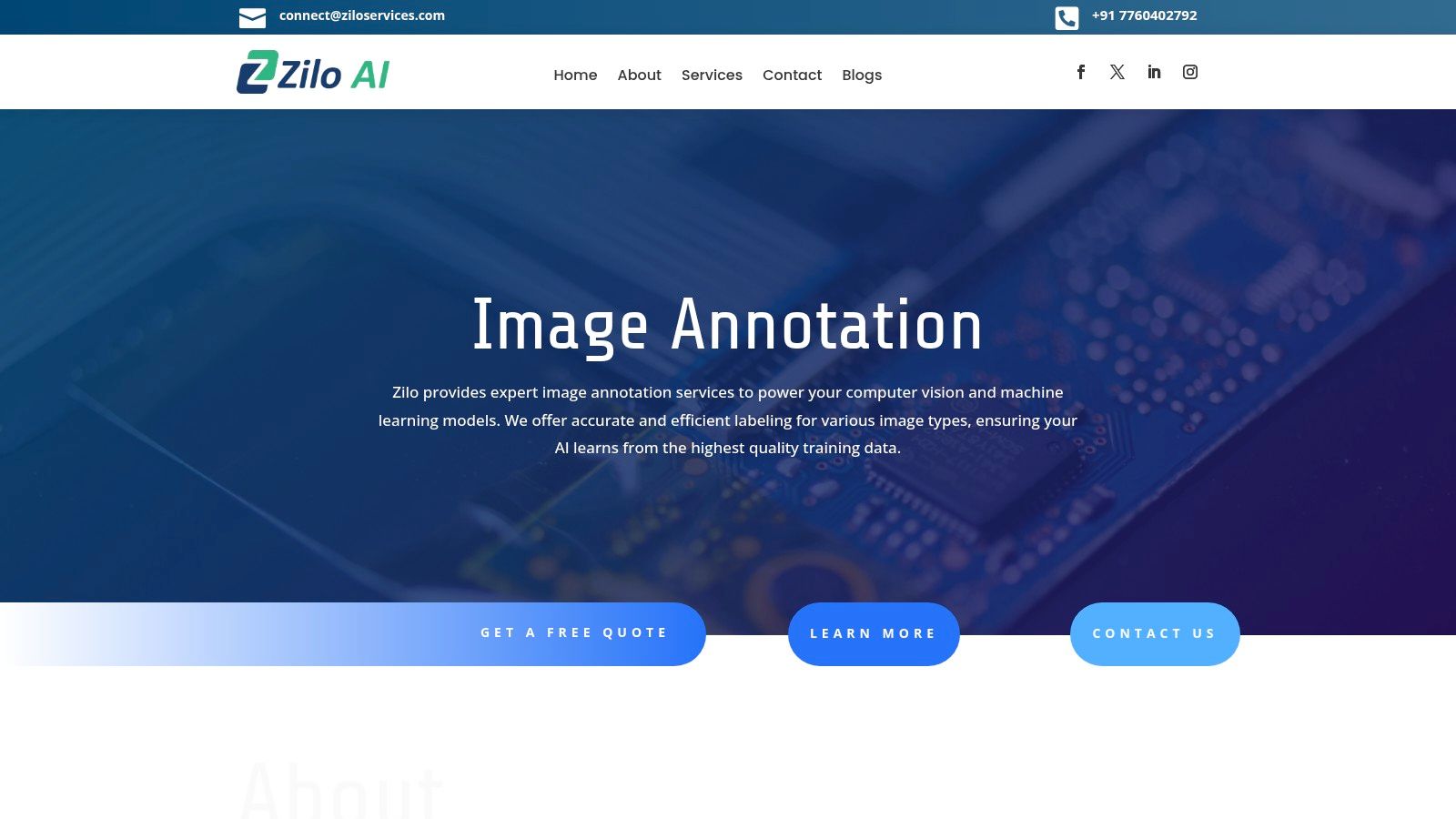
The core strength of Zilo lies in its comprehensive suite of annotation techniques. From fundamental bounding boxes for object detection to intricate polygon and semantic segmentation for detailed scene analysis, their capabilities cover the full spectrum of computer vision needs. This versatility makes them a one-stop solution for diverse industries, including autonomous vehicles, medical imaging, and retail analytics.
Key Features and Strengths
Zilo Services distinguishes itself through a combination of human expertise and advanced processes, ensuring superior output for machine learning models.
- Diverse Annotation Capabilities: Zilo supports a wide array of annotation types, ensuring they can handle nearly any image-based project. This includes:
- Bounding Boxes: For precise object detection and localization.
- Polygon Annotation: To capture complex, irregular shapes with high fidelity.
- Landmark Annotation: For identifying key points on an object, crucial for facial recognition or pose estimation.
- Image Classification: To categorize entire images based on predefined labels.
- Semantic Segmentation: For pixel-level classification to understand an entire scene in detail.
- Expert-Led Workforce: Backed by Zilo AI's decade-plus of experience, the service provides access to a large, globally distributed team of professional annotators. This managed workforce guarantees consistency and quality control, which is often a challenge with crowdsourced platforms.
- Scalability and Flexibility: Zilo is equipped to handle projects of any size, from small-scale startup experiments to massive enterprise-level datasets. Their flexible delivery models are designed to adapt to a client's specific timeline, budget, and complexity requirements.
- Multi-Modal Data Ecosystem: A significant advantage is Zilo's integration within a broader data services ecosystem. For projects that require more than just image data, they offer parallel services for text and voice annotation, making them an excellent partner for developing complex, multi-modal AI systems.
Use Cases and Implementation
Zilo's services are highly applicable across various sectors. In healthcare, their precise landmark and segmentation annotations are vital for training models that analyze medical scans like X-rays and MRIs. For the automotive industry, they provide the meticulously labeled data needed to train autonomous driving systems to recognize pedestrians, vehicles, and traffic signs. Before any annotation begins, a solid dataset is essential. For teams looking to build their own image repositories, learning how to efficiently extract images from web pages can be a crucial first step in the data pipeline.
Key Insight: Zilo's service-based approach shifts the burden of quality control, workforce management, and training from the client to the provider. This allows AI development teams to focus exclusively on model building and iteration, accelerating the development lifecycle.
Practical Considerations
As a managed service, Zilo does not offer a public pricing calculator. Prospective clients will need to engage in a direct consultation to receive a quote, as pricing is dependent on project scope, data volume, and the complexity of the required annotations. While this means less upfront transparency, it ensures the final proposal is accurately tailored to the project's unique needs. This hands-on, consultative approach is a hallmark of their enterprise-focused solution.
Learn more about their specialized offerings by visiting the Image Annotation Services page on ziloservices.com.
Best For:
- Enterprises requiring large-scale, high-accuracy image datasets.
- AI teams in specialized industries like healthcare, automotive, and retail.
- Organizations seeking a fully managed annotation service to avoid operational overhead.
- Projects that involve multi-modal data needs (image, text, and voice).
2. Labelbox
Labelbox positions itself as a comprehensive training data platform, designed to manage, annotate, and iterate on data to build better machine learning models. It’s a powerful piece of data annotation software that caters to teams needing a centralized hub for their entire data-centric AI development lifecycle, moving beyond simple labeling to encompass data management and model diagnostics.
The platform's core strength lies in its unified environment that supports a wide array of data types, including images, video, text, geospatial data, and even medical imaging formats like DICOM. This versatility makes it a go-to choice for complex projects in sectors like autonomous vehicles, medical AI, and agricultural tech.
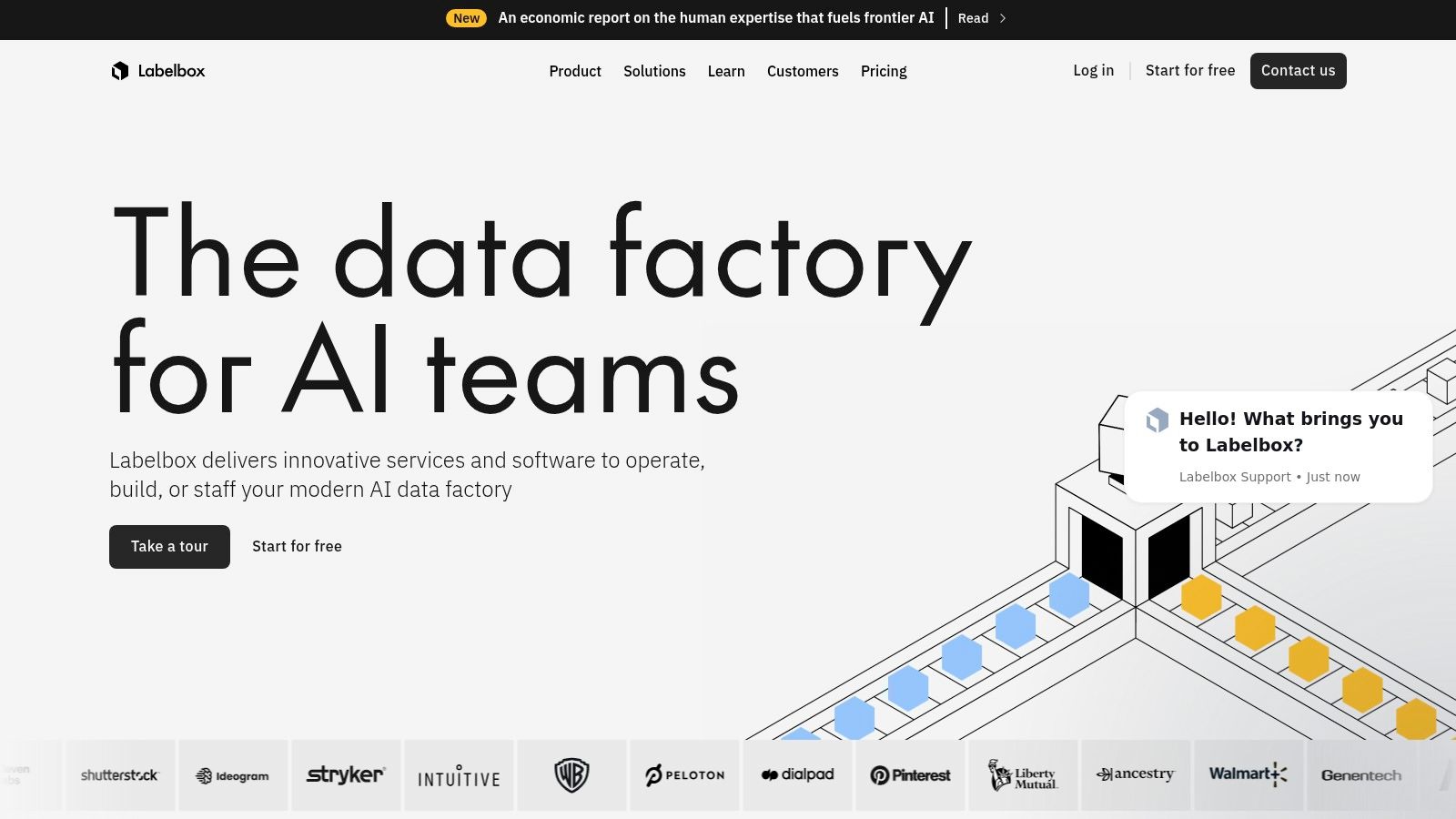
Key Features and Capabilities
Labelbox excels in providing tools that not only facilitate annotation but also accelerate and improve the entire process. Its model-assisted labeling feature, for instance, uses an existing model to pre-label data, which human annotators can then quickly review and correct. This significantly reduces manual effort and speeds up project timelines.
- Annotation Tools: Offers a full suite of tools, from simple bounding boxes and polygons to more complex semantic and panoptic segmentation, named entity recognition (NER) for text, and audio classification.
- Quality Assurance: Integrates robust QA workflows, including consensus scoring (where multiple annotators label the same asset to check for agreement) and customizable review steps to ensure high-quality output.
- Data Management: Provides a "Catalog" feature to search, visualize, and curate unstructured data before it even enters a labeling pipeline.
- Model Diagnostics: Uniquely connects labeled data back to model performance, allowing teams to identify and prioritize fixing model errors by focusing on specific data slices where the model underperforms.
Who Is It For?
Labelbox is particularly well-suited for established enterprise ML teams and well-funded startups that require a scalable, collaborative platform with advanced automation. For AI startups, understanding the nuances of such platforms is crucial for building a strong foundation. You can explore a deeper analysis of why data annotation is critical for AI startups to see how these tools fit into a broader growth strategy.
Pricing and Access
Labelbox offers tiered pricing:
- Free: A generous free tier for individuals and small teams, offering core labeling features for up to 5,000 labeling units.
- Pro: A tailored plan for growing teams, offering more advanced features and collaboration tools.
- Enterprise: A custom solution for large organizations, providing features like enterprise-grade security, dedicated support, and advanced integrations.
Pricing for Pro and Enterprise tiers is quote-based, reflecting the platform's focus on scalable, high-end solutions, which might be a significant investment for smaller operations.
Website: https://labelbox.com
3. SuperAnnotate
SuperAnnotate is an end-to-end platform designed to build, annotate, and manage high-quality training data for computer vision and NLP projects. It positions itself as a powerful piece of data annotation software that combines advanced tooling with integrated workflow management and powerful automation, aiming to accelerate the entire data pipeline from labeling to model deployment.
The platform is engineered to handle complexity, supporting a wide variety of annotation types and use cases. Its key differentiator lies in its focus on annotation acceleration and pixel-perfect accuracy, making it a strong contender for teams in industries like autonomous driving, medical imaging, and robotics where precision is non-negotiable.
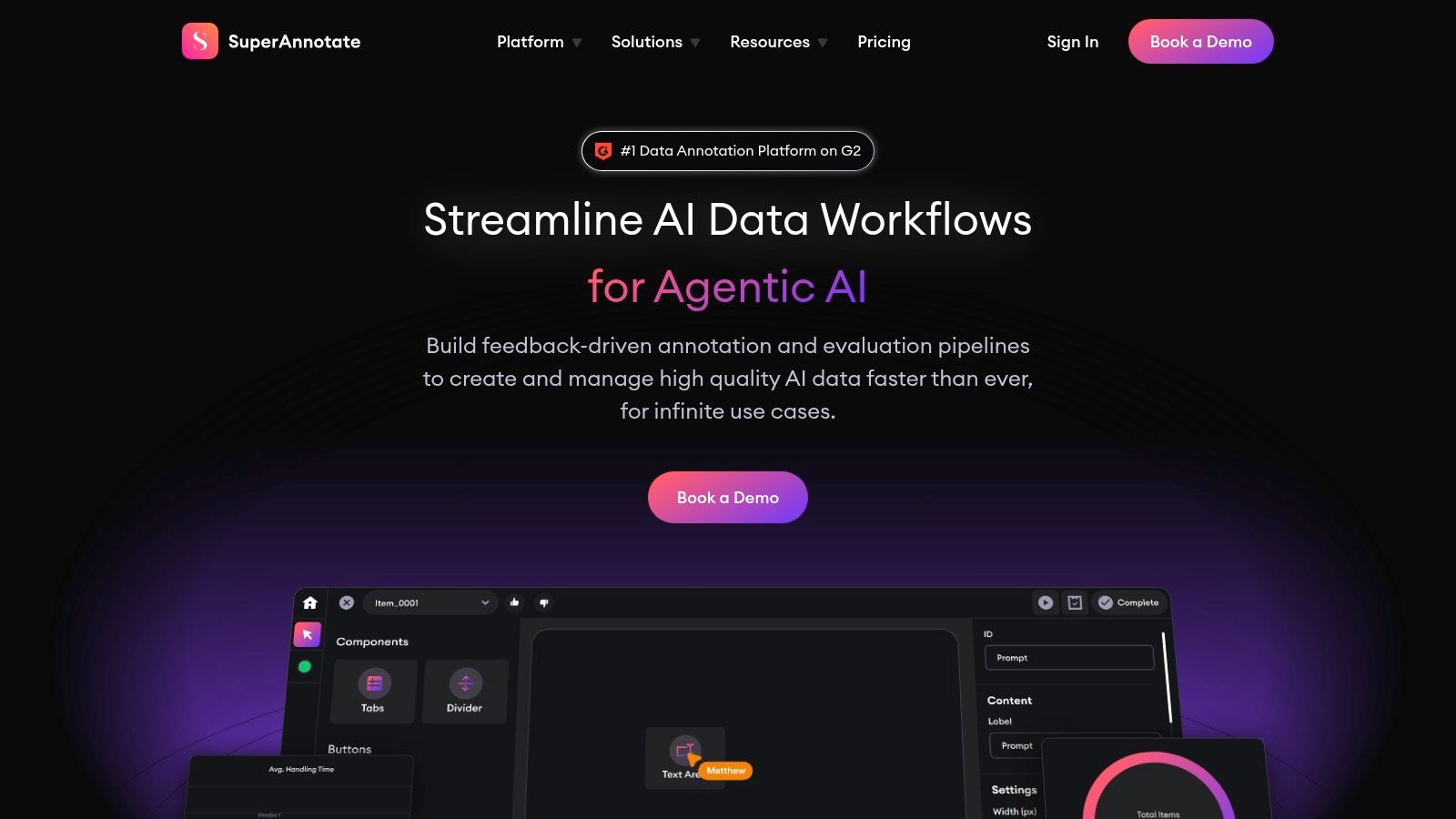
Key Features and Capabilities
SuperAnnotate's feature set is built around speed, quality, and collaboration. It provides tools that not only streamline the manual labeling process but also integrate AI assistance directly into the workflow. The AI-powered pre-annotations, for example, can automate a significant portion of the labeling work, allowing human annotators to focus on review and correction.
- Annotation Tools: Offers a comprehensive suite of tools for images and video, including bounding boxes, polygons, polylines, keypoints, and advanced semantic and panoptic segmentation.
- AI-Powered Assistance: Utilizes smart prediction and active learning to pre-label data, significantly reducing manual effort and improving annotator efficiency over time.
- Quality Assurance: Features built-in QA workflows with customizable review stages, consensus-based scoring, and detailed analytics to monitor annotator performance and ensure data accuracy.
- Collaboration & Management: Provides robust project management features, enabling team leaders to assign tasks, track progress, and manage complex annotation pipelines with multiple stakeholders.
Who Is It For?
SuperAnnotate is ideal for computer vision teams, from startups to large enterprises, that require highly accurate annotations for complex projects. Its combination of advanced tooling and user-friendly management makes it suitable for organizations that need to scale their data operations without compromising on quality. The platform’s excellent customer support is also a significant plus for teams who may need guidance during setup or project execution. While the initial setup can be time-consuming, the investment often pays off in annotation speed and quality down the line.
Pricing and Access
SuperAnnotate provides several pricing tiers to accommodate different team sizes and needs:
- Starter: A free plan designed for individuals and small teams to explore the platform's core functionalities.
- Pro: A tailored plan aimed at startups and growing businesses, offering more advanced features, collaboration tools, and increased capacity.
- Enterprise: A custom solution for large organizations with complex needs, providing enterprise-grade security, dedicated support, and on-premise deployment options.
The Pro and Enterprise plans are quote-based, reflecting their focus on providing scalable, customized solutions for serious ML development.
Website: https://superannotate.com
4. Scale AI
Scale AI has established itself as a premier data-centric AI platform, specializing in delivering high-quality, production-grade training data for the most demanding machine learning applications. It is a powerful piece of data annotation software and service combined, trusted by leaders in autonomous driving, generative AI, and government sectors. The platform is engineered to handle massive datasets with a focus on precision, speed, and reliability.
What sets Scale AI apart is its hybrid approach, which masterfully combines a managed, expert human workforce with sophisticated AI-powered tools. This synergy allows them to tackle extremely complex annotation tasks, such as 3D sensor fusion for self-driving cars and nuanced content moderation for large language models, ensuring that the final data meets the highest standards of accuracy required for mission-critical AI systems.
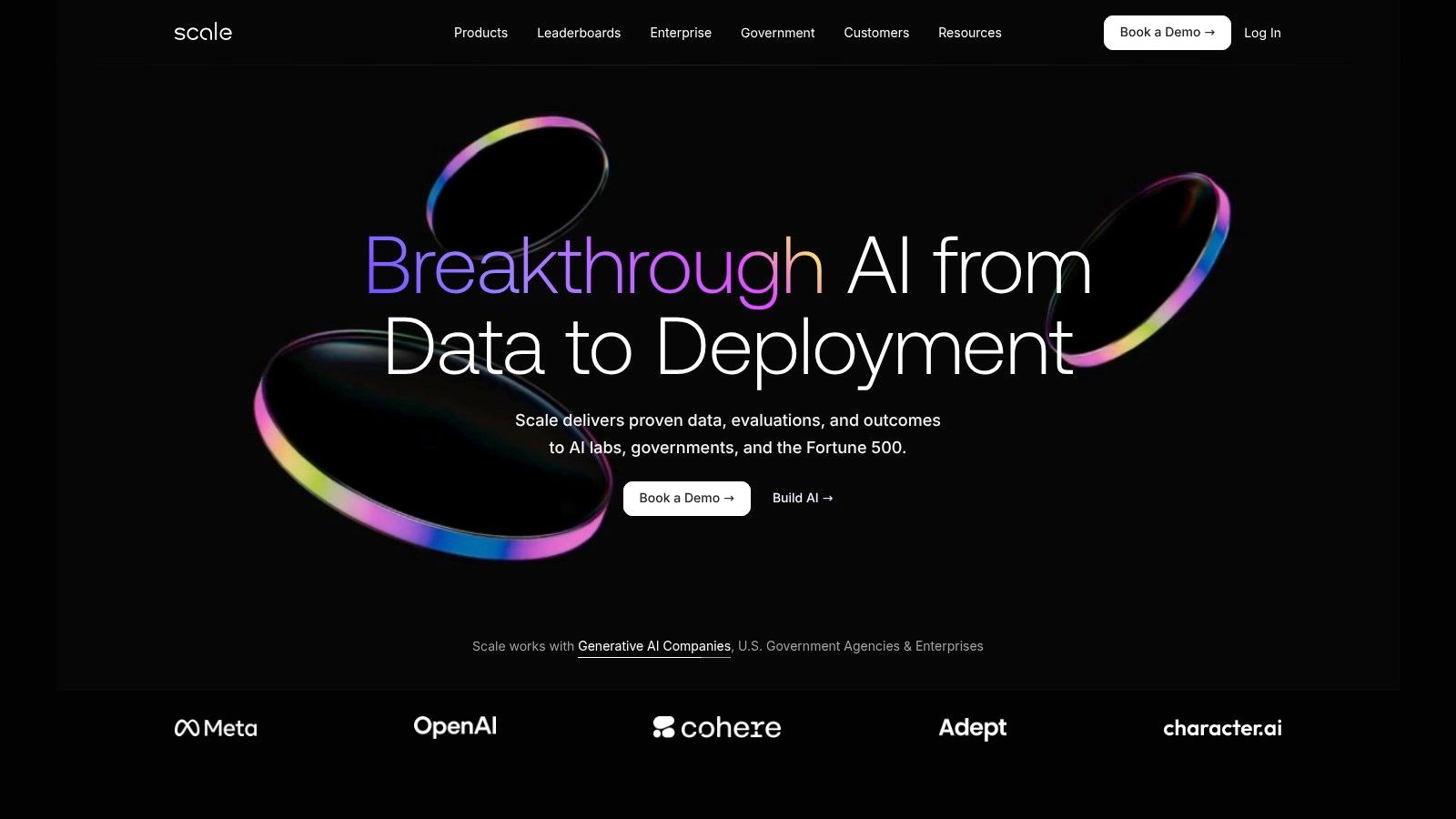
Key Features and Capabilities
Scale AI's platform is built for enterprise-grade challenges, offering a robust suite of features designed to accelerate the development of high-performing models. Its services are not just about labeling; they encompass the entire data lifecycle, from collection and annotation to evaluation and fine-tuning.
- Advanced Data Annotation: Supports a wide variety of data types and annotation methods, including 2D image and video (bounding boxes, polygons), 3D sensor fusion (LiDAR and RADAR), text annotation (NER, classification), and audio transcription.
- Human-in-the-Loop System: Employs a combination of automated pre-labeling and a highly trained human workforce. This model ensures that simple tasks are automated while complex, edge-case scenarios receive expert human review.
- Rigorous Quality Control: Implements multi-layered quality assurance protocols, including consensus scoring, gold standard datasets for benchmarking annotator performance, and programmatic quality checks to guarantee data accuracy at scale.
- Data Engine: A comprehensive suite of tools for managing and improving datasets. It includes features for data curation, model evaluation (Scale EVal), and active learning to identify the most valuable data to label next.
Who Is It For?
Scale AI is purpose-built for large enterprise clients and pioneering AI companies that operate at a massive scale and require impeccable data quality. It is the go-to solution for industries like autonomous vehicles, robotics, generative AI, and e-commerce, where model performance is directly tied to business outcomes and safety. Its focus on complex, high-stakes projects makes it less suitable for small teams or individual developers on a tight budget.
Pricing and Access
Scale AI operates on a fully managed, quote-based pricing model. The cost is tailored to the specific needs of a project, factoring in the volume of data, the complexity of the annotation tasks, and the required quality level. This enterprise-focused approach means pricing is typically higher than self-serve platforms, reflecting the premium quality and end-to-end management provided. Access is granted through direct consultation with their sales team to scope out project requirements.
Website: https://scale.com
5. Appen
Appen stands as a global leader in the data annotation landscape, differentiating itself by combining a powerful technology platform with a vast, diverse crowd of over one million skilled contractors. Rather than just offering data annotation software as a standalone tool, Appen provides a fully managed service, making it an ideal partner for organizations that need high-quality, large-scale training data without managing the annotation process internally.
The company leverages over 25 years of experience to support a wide range of data types, including text, image, video, audio, and more complex multimodal datasets. This deep expertise allows them to handle projects with nuanced requirements across various industries, from autonomous vehicles and technology to finance and healthcare, ensuring data is prepared to meet the specific demands of sophisticated AI models.
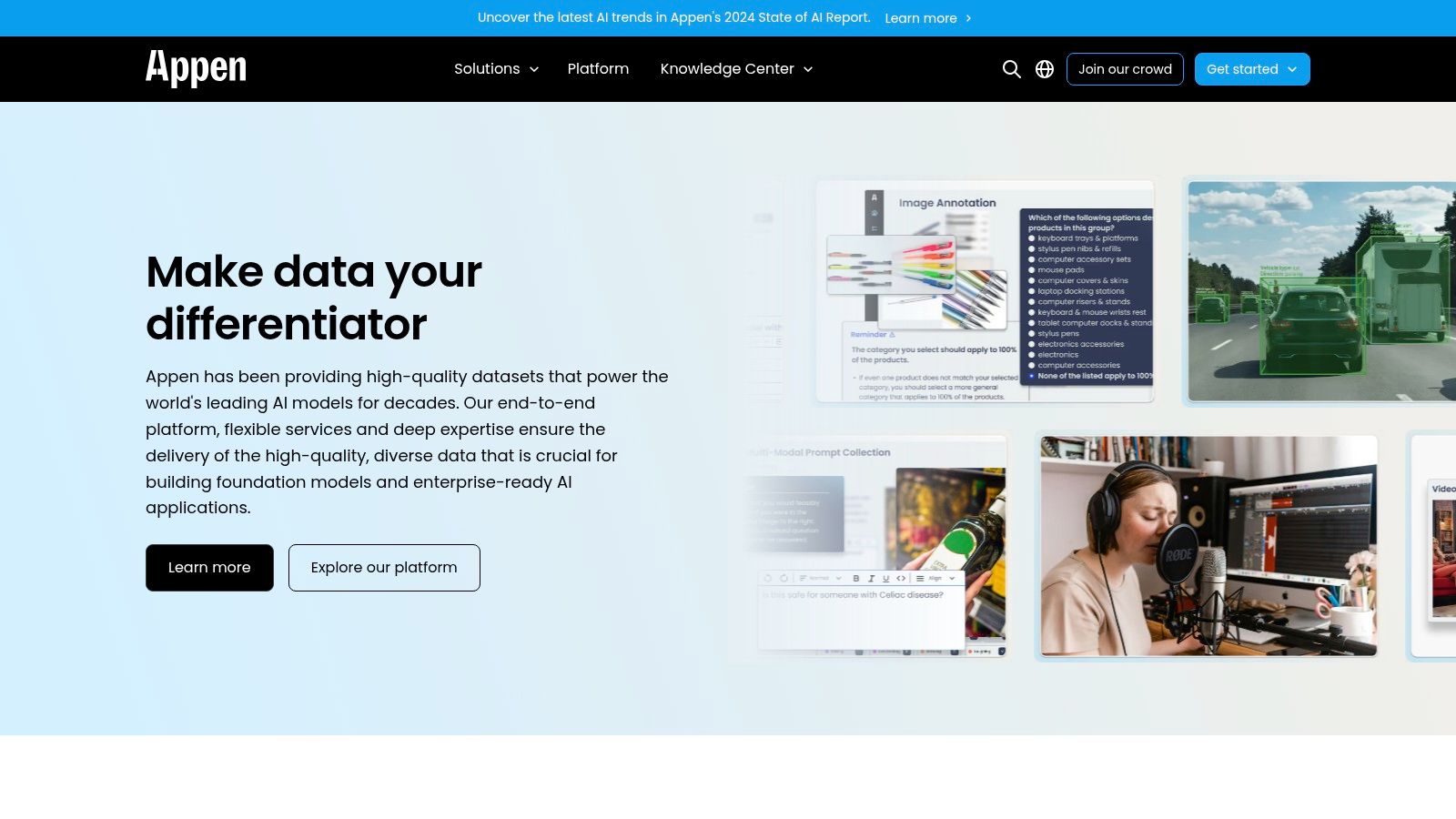
Key Features and Capabilities
Appen's strength lies in its comprehensive, managed approach that blends human intelligence with advanced platform features. This hybrid model ensures both scale and quality, which can be difficult to achieve with software alone.
- Global Workforce: Access to a managed, diverse crowd of annotators across 170 countries and speaking more than 235 languages, which is critical for projects requiring localization or specific cultural context.
- Data Type Expertise: Proficient in handling diverse annotation tasks, including semantic segmentation for images, named entity recognition for text, sentiment analysis, audio transcription, and content relevance for search engines.
- Flexible Service Models: Offers a range of engagement models from fully managed services, where Appen handles the entire data pipeline, to using their platform with your own teams.
- Robust Quality Control: Implements multi-step quality assurance processes, including gold standard questions, consensus scoring, and automated checks to guarantee data accuracy and consistency.
Who Is It For?
Appen is an excellent choice for large enterprises and research institutions that require massive volumes of high-quality, diverse training data and prefer to outsource the operational complexities of annotation. It is also well-suited for companies scaling AI initiatives that demand specialized linguistic or domain expertise. For businesses looking at a managed service approach, you can explore other top data annotation service companies to compare offerings. However, it might be less ideal for startups or teams wanting direct, hands-on control over the annotation tools and process.
Pricing and Access
Appen’s pricing is primarily project-based and customized according to the scope, complexity, data volume, and quality requirements of the specific project.
- Project-Based Pricing: Clients receive a custom quote after a consultation to define project needs. This model ensures the solution is tailored to the business's specific goals and budget.
- Platform Access: For teams that prefer to manage their own annotation workforce, Appen offers access to its annotation platform, with pricing structured based on usage and feature set.
The customized, service-oriented model means costs can be higher than off-the-shelf software, especially for smaller projects, reflecting the value of its managed workforce and quality guarantees.
Website: https://appen.com
6. CloudFactory
CloudFactory distinguishes itself by blending a managed human workforce with powerful technology, offering a scalable solution for companies needing high-volume, high-quality data annotation. Rather than just providing a tool, it delivers a complete data labeling service, making it a unique player in the data annotation software ecosystem. This approach is designed for teams that want to outsource the entire annotation process to a trusted partner focused on ethical practices and consistent output.
The company's model is built on providing "cloud workers" who are trained and managed to handle specific client projects, from computer vision to natural language processing. This human-in-the-loop system ensures that complex and nuanced annotation tasks are completed with the accuracy that pure automation often struggles to achieve, while still leveraging technology to maintain efficiency and scale.
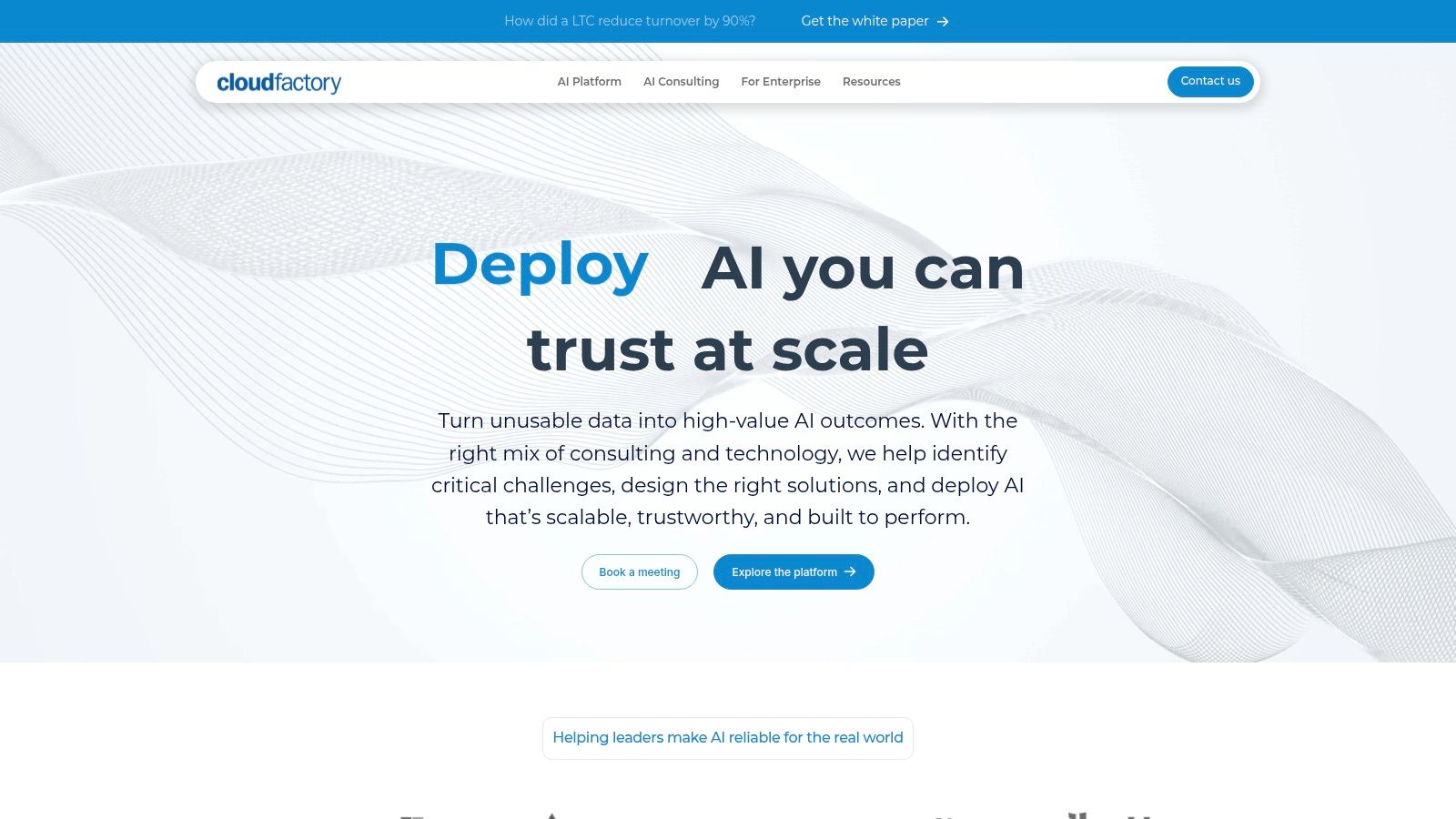
Key Features and Capabilities
CloudFactory’s strength lies in its full-service, workforce-as-a-service model, which integrates seamlessly with a client's existing MLOps pipeline. The platform is technology-agnostic, meaning it can work within the client’s preferred annotation tools or provide its own.
- Scalable Workforce: Provides access to a professionally managed and trained workforce that can scale up or down based on project demands, ideal for long-term, large-scale initiatives.
- AI-Assisted Labeling: Employs active learning and AI-powered pre-annotation to accelerate the labeling process. Human annotators focus on reviewing, correcting, and handling edge cases, which improves both speed and quality.
- Integration Flexibility: Offers robust API and integration capabilities, allowing it to connect with popular cloud storage services (like AWS S3, Google Cloud Storage) and various data labeling platforms.
- Ethical Sourcing: A core part of its mission is to provide meaningful work to individuals in developing nations, ensuring fair wages and positive working conditions, which is a key differentiator for socially conscious organizations.
Who Is It For?
CloudFactory is best suited for established tech companies, large enterprises, and research institutions that require a reliable, scalable, and fully managed solution for their data labeling needs. It is particularly valuable for businesses in retail, finance, and healthcare that have massive datasets and need a long-term partner rather than just a software tool. Organizations prioritizing ethical outsourcing and social impact will also find its model highly appealing.
Pricing and Access
CloudFactory operates on a flexible, quote-based pricing model tailored to the specific needs of each project. Pricing is typically determined by factors such as the volume of data, the complexity of the annotation tasks (ontology), and the required turnaround time.
While this approach is less transparent than tiered SaaS pricing, it allows for a customized solution that aligns with large-scale project budgets. The main drawbacks are that its services come at a premium compared to self-service tools, and the onboarding process for highly specialized or niche projects may require a longer ramp-up period to train the workforce effectively.
Website: https://cloudfactory.com
7. Fiverr
Fiverr takes a different approach to data annotation by functioning as a massive online marketplace for freelance services rather than a dedicated software platform. It’s not a piece of data annotation software in the traditional sense, but rather a hub where you can hire individuals or small teams to perform labeling and annotation tasks using their own tools. This model provides immense flexibility and access to a global talent pool for projects of nearly any scale or budget.
The platform's key distinction is its a-la-carte service model. Instead of committing to a software subscription, you can find freelancers specializing in specific annotation types, from image bounding boxes and polygon segmentation to text categorization and audio transcription. This makes it a highly accessible entry point for startups, researchers, or companies with intermittent or small-scale annotation needs.
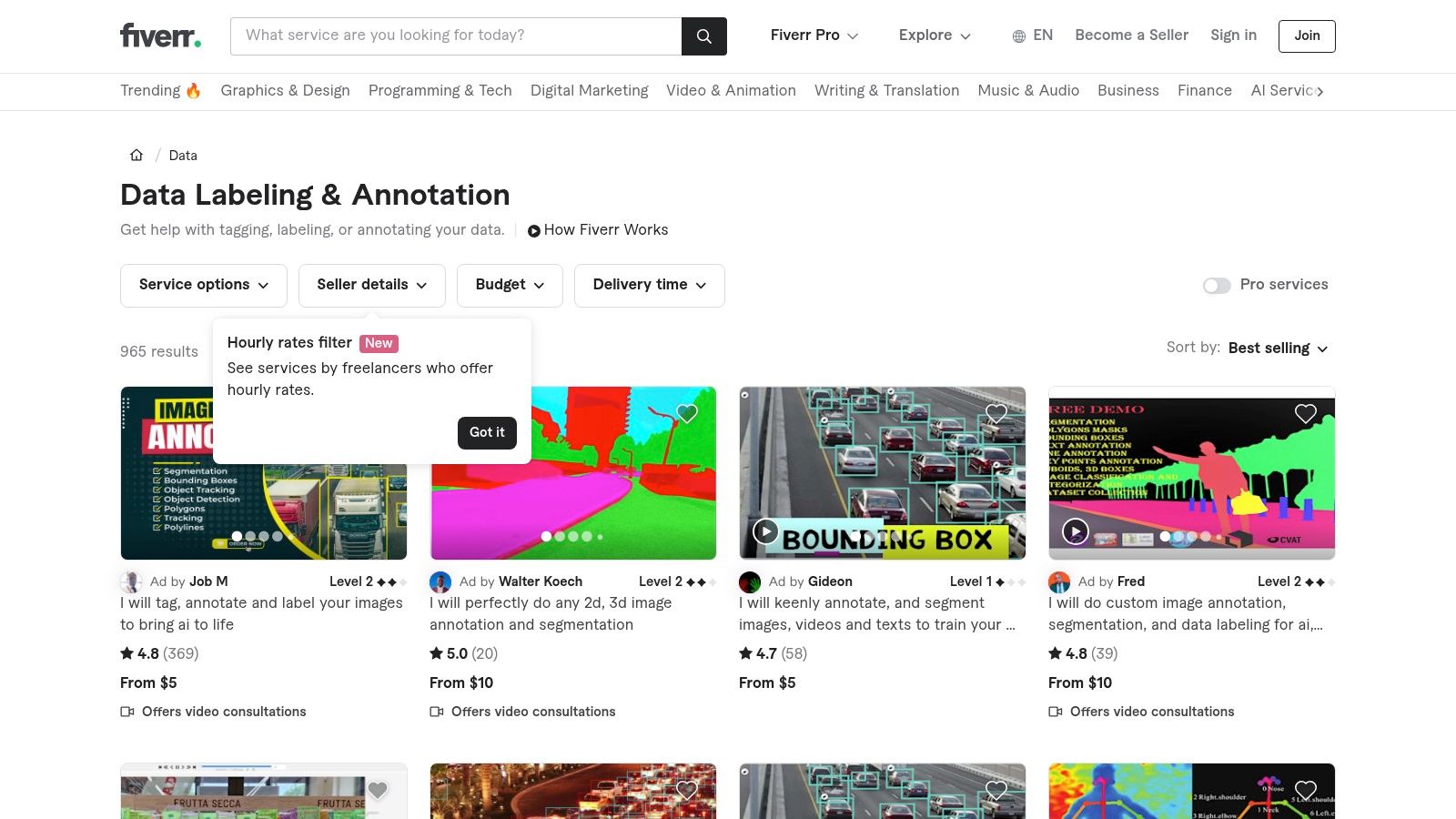
Key Features and Capabilities
Fiverr's strength lies in its marketplace dynamics, offering a vast selection of human resources that can be deployed quickly. The platform is built to facilitate transactions between buyers and sellers of services, with features geared towards finding the right talent for your specific data annotation job.
- Diverse Freelancer Pool: Gain access to a wide array of freelancers with varying skill levels, specializations, and price points, suitable for diverse annotation requirements.
- Flexible Pricing: Gigs are often priced per task, per hour, or per project, allowing for cost-effective solutions, especially for smaller datasets or one-off projects.
- Review and Rating System: You can evaluate freelancers based on their profiles, past work portfolios, and ratings from previous clients, which helps in vetting potential candidates.
- Quick Turnaround: The competitive nature of the marketplace often leads to very fast project completion times, as freelancers are motivated to deliver quickly to secure positive reviews.
Who Is It For?
Fiverr is an ideal choice for startups, small businesses, and academic researchers who need data annotation services without the overhead of a complex software platform. It works best for those with well-defined, straightforward annotation tasks who prioritize cost-effectiveness and speed for smaller-scale projects. It's less suited for large enterprises that require integrated quality control, complex workflows, and enterprise-grade data security.
Pricing and Access
Fiverr's pricing is entirely variable and depends on the freelancer you choose to hire.
- Gig-Based Pricing: Freelancers set their own rates, with projects starting from as low as $5 (the platform's namesake) and scaling up to thousands of dollars for complex, large-volume tasks.
- No Subscription Fees: There are no platform subscription costs; you only pay for the services you procure. Fiverr takes a commission from the freelancer's earnings.
- Custom Offers: You can contact freelancers directly to negotiate a custom offer tailored to your specific project scope, dataset size, and budget.
This model makes it one of the most financially accessible options, but it places the burden of quality control and project management squarely on the buyer.
Website: https://www.fiverr.com/categories/data/data-labeling-annotation
Data Annotation Software Comparison: Top 7 Providers
| Service | Implementation Complexity 🔄 | Resource Requirements ⚡ | Expected Outcomes 📊 | Ideal Use Cases 💡 | Key Advantages ⭐ |
|---|---|---|---|---|---|
| Zilo Services | Moderate – expert annotators and flexible models | Medium to High – professional team and scalable infrastructure | High-quality, precise annotation enhancing model accuracy | Enterprises needing reliable, scalable image annotation | Wide annotation techniques, expert-backed, multi-modal integration |
| Labelbox | Moderate to High – platform setup and feature learning | Medium – versatile tools with automation | Efficient, scalable annotation with quality assurance | Teams needing collaboration and multi-data type support | User-friendly, advanced automation, scalable for large projects |
| SuperAnnotate | High – time-consuming initial setup | Medium to High – AI-powered tools and quality control | Accurate, reliable annotations supporting complex projects | Complex annotation projects requiring precision and collaboration | AI pre-annotations, wide format support, excellent support |
| Scale AI | Low to Moderate – service-focused | High – combines human experts with automation | High-quality, scalable annotations with strong QA | Large enterprises requiring precision and diverse annotation types | Supports LiDAR, strong QA, scalable enterprise solutions |
| Appen | Low – flexible and customizable services | High – diverse global workforce | High-quality training data across multiple data types | Projects needing varied data types and flexible customization | Large workforce, multi-domain expertise, strong QA |
| CloudFactory | Moderate – integration and onboarding needed | Medium to High – mix of automation and human expertise | Scalable, ethically managed annotation with long-term focus | Large-scale projects emphasizing ethical practices | Scalable, integration flexibility, ethical outsourcing |
| Fiverr | Low – simple freelancer hiring | Low – variable freelancer resources | Variable quality, potentially fast and cost-effective | Small or budget-sensitive projects requiring flexible resource | Cost-effective, flexible freelancer selection, quick turnaround |
Making Your Choice: A Strategic Framework for Selecting the Right Partner
The journey from raw, unstructured data to high-quality, actionable training datasets is the bedrock of modern artificial intelligence. As we've explored, the landscape of data annotation software is diverse, populated by powerful platforms like Labelbox, versatile solutions like SuperAnnotate, and enterprise-focused giants like Scale AI and Appen. Each tool offers a unique blend of features, services, and pricing models designed to address specific project needs, from simple image labeling to complex, multi-modal sensor fusion annotation.
We've seen how specialized providers and even freelance platforms like Fiverr can fill niche roles, but the central challenge remains: selecting a partner that not only provides the software but also aligns with your strategic goals, operational workflows, and quality benchmarks. The decision transcends a simple feature-to-feature comparison; it’s about forging a partnership that can scale with your ambitions and adapt to the evolving complexities of your AI initiatives.
Recapping the Core Decision Factors
Your choice will ultimately be guided by a combination of key factors we've discussed. Before making a final decision, revisit these critical questions with your team:
- Data Type and Complexity: Are you primarily working with 2D images, or do your projects involve intricate 3D point clouds, video sequences, medical DICOM files, or nuanced multilingual text? The more complex your data, the more specialized the annotation toolset you'll require.
- Workforce Model: Do you have an in-house team that needs a powerful software-as-a-service (SaaS) platform to enhance their productivity? Or do you require a fully managed, external workforce to handle the entire annotation pipeline? Perhaps a hybrid approach, where software is augmented by on-demand experts, is the best fit.
- Quality Assurance and Control: What level of precision is non-negotiable for your models? Look for platforms that offer robust, multi-layered QA workflows, including consensus scoring, automated checks, and review loops. High-stakes applications in healthcare or autonomous driving demand near-perfect accuracy, which must be supported by the tool's core architecture.
- Scalability and Integration: Your needs today will not be your needs tomorrow. Does the software integrate seamlessly with your existing MLOps stack and cloud storage? Can it handle a sudden tenfold increase in data volume without a drop in performance or a massive spike in cost? A scalable partner prevents future bottlenecks.
A Strategic Framework for Evaluation
Instead of getting lost in feature lists, apply a strategic lens to your evaluation process. Consider these three pillars to guide your selection of data annotation software.
- Total Cost of Ownership (TCO), Not Just Licensing Fees: Look beyond the initial subscription or per-annotation price. Calculate the TCO by factoring in the time your engineers spend managing the platform, the cost of re-work due to poor quality, and the potential expense of training an external workforce. A slightly more expensive platform with a highly efficient, managed service can often deliver a lower TCO and faster time-to-market.
- The Partnership Quotient: Evaluate the provider as a long-term partner, not just a vendor. Do they offer dedicated project managers and solutions architects? How responsive is their support team? A true partner invests in your success, offering strategic advice on annotation best practices and helping you optimize your data pipeline.
- Future-Proofing Your AI Pipeline: The ideal platform is one that grows with you. Assess the company’s product roadmap. Are they investing in R&D for emerging data types and automation features like model-assisted labeling? Choosing a forward-thinking provider ensures you won't need to migrate to a new system in two years when your project requirements become more advanced.
Ultimately, the right data annotation software is a strategic enabler. It's the critical infrastructure that empowers your data scientists to focus on building innovative models rather than managing manual labeling processes. By carefully weighing your specific project needs against the capabilities, workforce models, and strategic vision of each provider, you can select a partner that accelerates your AI development journey and delivers a significant competitive advantage.
Ready to move from evaluation to execution with a partner dedicated to your success? Zilo AI combines a state-of-the-art annotation platform with fully managed, expert-led data labeling services to deliver pixel-perfect accuracy at scale. Discover how our tailored solutions for enterprise and startup teams can accelerate your AI initiatives by visiting Zilo AI today.

